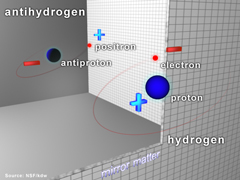What is Antimatter?
|
Albert Einstein came up with the famous equation,
E=mc^2
And thus defined mass as highly concentrated energy. With sufficiently
high concentrations of energy, that energy can form matter. However when
this matter is created it is balanced out by the creation of antimatter.
|
 |
When matter and antimatter come into contact they annihilate each other
and release large amounts of energy. A teaspoon of antimatter, reacting with
matter, would run a car continuously for 100,000 years.
 |
Not all particles have equivalent or rather, separate antiparticles.
The electron and proton, as well as quarks, have antiparticles, such as
the positron and antiproton because they have a charge to reverse. The neutron
has an antiparticle because, although it has no charge, it has a magnetic
moment to which the antineutron is opposite. The photon, however has only
mass and directional velocity, thus there is no antiphoton. |
Protons and neutrons also have a baryon number and their antiparticles have
an equal but opposite baryon number.
Title
Page - What
is Antimatter? - The
History of Antimatter - The
Big Bang - The
Imbalance - Antimatter: Now and Later
- Bibliography
Images are linked to the website where they
were found. If you wish a image to be removoed that is your propterty, email
shkkmo2@gmx.net